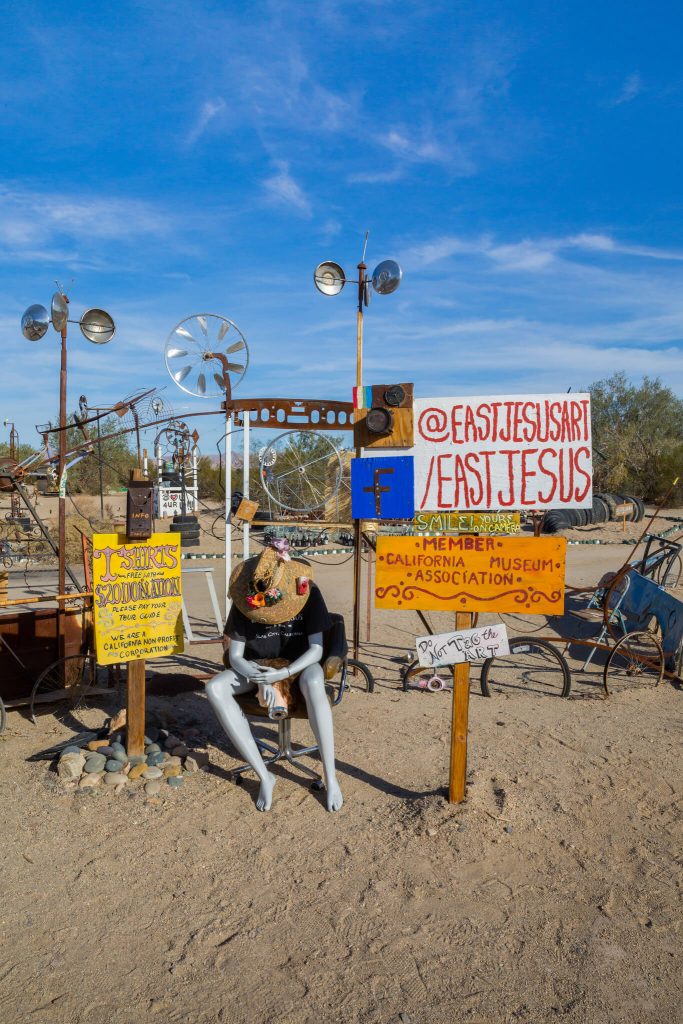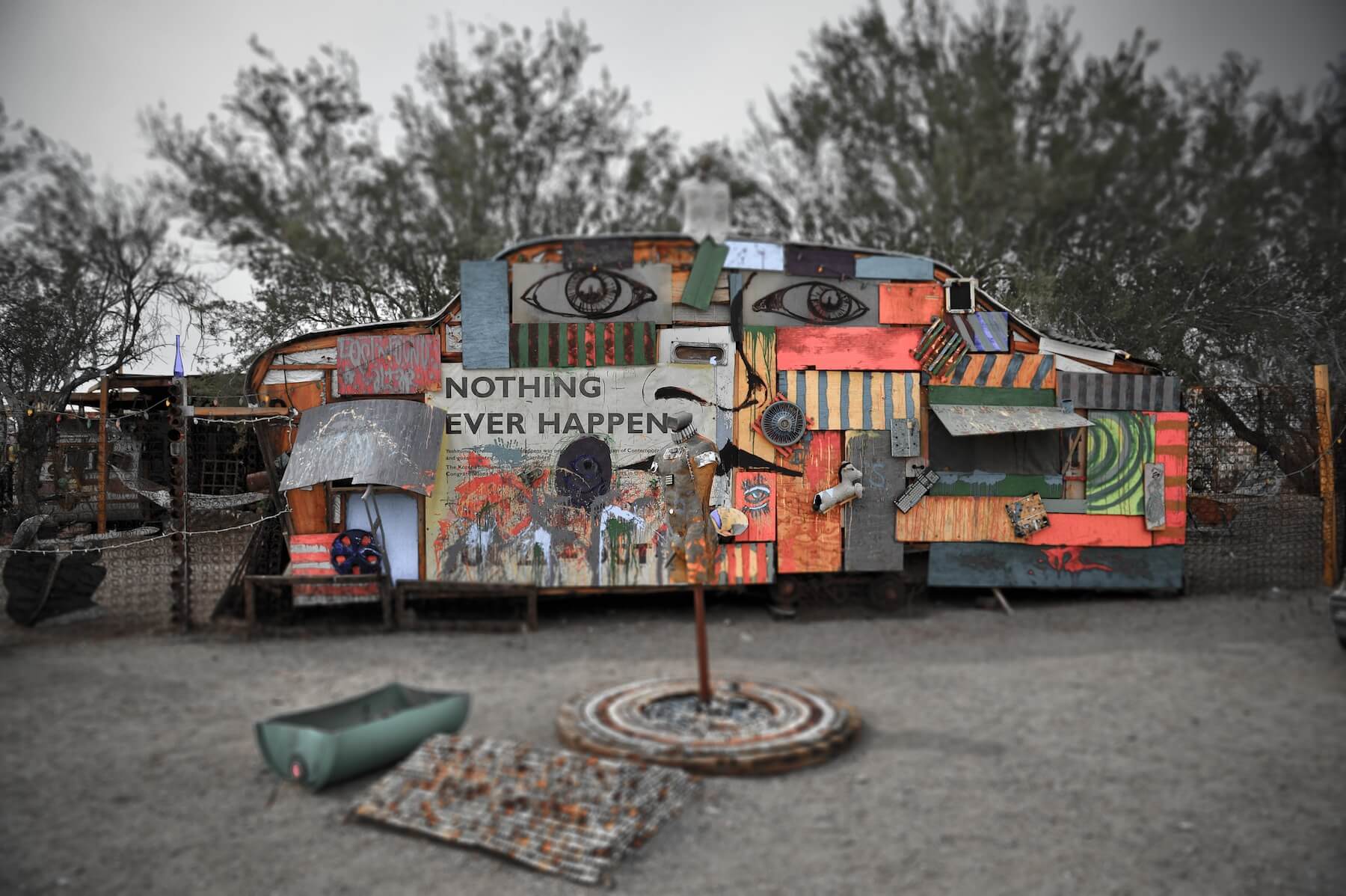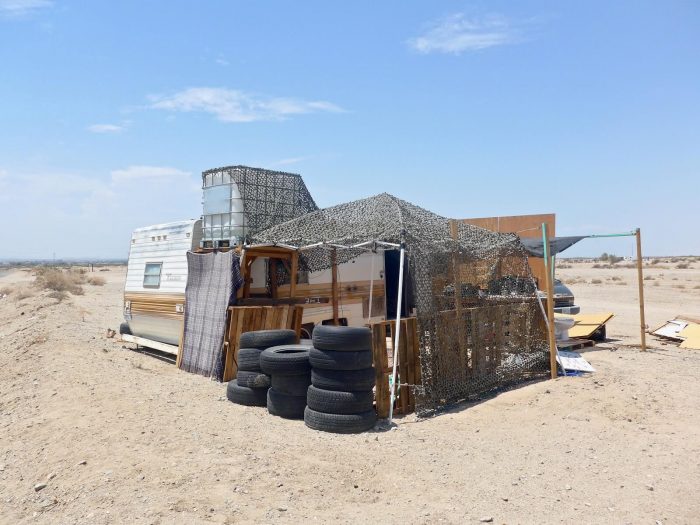Advertisement
The structures appear mirage-like on the horizon. First a single tent, seemingly burnt pale by years of neglect in the desert sun. Then a few miles down the road a camper van decorated with two skeletons perched on the roof, holding the American flag.
As I approach, more dwellings appear – three, four – in small groups, or spread out at random. Maybe 50 or 100 in total. A sprawling mass of reclusive humanity lay hidden within, not yet visible to a casual visitor.
I had become fascinated by Slab City after I first heard about it in the film Into the Wild. The Slabs, as it’s known, is a largely transient community of vagabonds and vagrants living on the remains of an abandoned army base in the California Badlands. This concept of disconnecting from the norm disturbed yet excited me. Here was a group of individuals who, by their own admission, had given up what most of us strive to hold on to – jobs, loved ones, material possessions. What was their goal? What was their reasoning? These and many other questions run through my mind as I park the car next to a sign that reads ‘East Jesus’.
Leaving the relative safety of the car, I head down a small dirt track towards a collection of caravans clustered loosely together. The heat is oppressive and seems to suck the moisture from my very bones. Rusted old junkers with smashed windows and missing tyres line one side of the road. Children’s dolls with their limbs torn off lie scattered in the dirt, and an ancient couch with one spring protruding proudly from the stuffing sits miserably to one side. I notice a plastic camp chair with the words ‘Welcome to Camp Deal with the Devil’ scribbled on the underside in
permanent marker.
Advertisement
I am still busy taking it all in when I hear the unmistakable sound of voices, angry voices. The last thing I want to do is cause any trouble – me, some kid fresh from the urban world somehow getting caught up in a desert brawl. My overactive imagination plays out the discussion about what to do with my body: ‘We can just bury him out back, or leave him for the vultures.’

Intrigued, I follow the voices to a small hut just to the right of the caravans. Peering through a screen door, I try to make out the shapes of those within. ‘Spyder, you’ve got a visitor,’ a voice says from beyond the threshold. ‘Hey
man, don’t stand out there. Come on in.’ The voices aren’t angry, they’re just loud.
It’s dark inside the little hut and my eyes take a while to adjust from the glare of the desert outside. As things become clearer, I realise I’m standing in a bar. A string of fairy lights and an old guitar hang from the ceiling, two old-timers are sitting in the corner watching TV. To the right behind a clapboard countertop stands a shirtless man – weather-beaten skin covered in tattoos, shoulder-length hair, grey goatee and kind eyes.
‘Welcome to the Ponderosa Saloon. I’m Spyder – and this is Jimmy,’ says the bartender, pointing to a short, roundish man before stretching out his hand for a shake. ‘You thirsty? We have beer or beer – what will it be?’
I am about to answer when the familiar red and white of a Budweiser is placed in front of me. ‘What brings you all the way out here?’ asks Spyder.
‘Lack of a better idea?’ I venture. ‘To be honest, I just quit my job and figured the best way to celebrate would be a trip across the States.’ This answer is greeted by warm applause from Jimmy and the two old-timers in the back. This is rather shocking as most people I had told about my departure from the tax-paying life looked at me as if I were telling some sort of sordid joke. This is the first time my decision has been met without judgement. Clearly employment isn’t high on the priority list around here.
Spyder gives me a knowing look ‘Seems you understand, which not very many people do these days.’
I’m still trying to figure out this pearl of desert wisdom when he says, ‘Come on, let me show you around.’ We walk, and he talks, pointing out various features of his encampment.
“I’ve been here seven years. Back then I had one trailer and a tent. The rest of this stuff just sort of materialised as time went by. I never asked for any of it. You see, it’s a community out here; we all help each other out. I think a lot of folks in this country should look at that.”
There are a million questions burning through my brain but I don’t ask any of them. It feels wrong, deeply wrong to question their way of life. The more I listen to him speak, the more it becomes clear that Spyder, like so many other folks out here, is simply misunderstood. Either that or he is totally insane. Seven years of choosing to remove himself from the ease and security of a nineto-five job, credit cards and the white picket fence – ideals that so many people believe in. Surely no sane man would by choice deny himself these basic needs. After all, as a species, these are
the things that we crave the most, it’s ingrained in our DNA – shelter, safety, security. There was not much safety or security out here, at least not that I could see. Then again, perhaps he was on to something. Desert living means less
– out here, you’re stripped away from the noise of modern living and its constant bombardment of unrealistic social comparisons and expectations.
Perhaps he had the ability to see past all the clutter. After all, most of us spend money we don’t have on things we don’t need, to impress people we don’t know. In this case, less really was more. Thoughts and focus could shift onto the immediate as that’s all there is, all there needs to be. Don’t worry about yesterday, that’s past; don’t worry about tomorrow, that’s not here yet; in fact just don’t worry. A radical thought dawns on me: I could be speaking to one of the last truly free men in America.
Slab City exists truly on the fringe. There’s nothing to legitimise its existence, federally or otherwise. Just a few concrete slabs left over from when the army had a base here back in the 1960s. What’s important to note is that these people are here by choice. They seek no pity. In fact, I believe if there is any pity to be given, it is they who would pity us, and our belief that richness can only be attained through ever-expanding bank balances. I sense something else – could it be peace? There is a lack of fear in their voices, and a steadfastness in their gaze. They are undaunted by
the box society would place them in, for it is safe for society to do so. It’s easier to brand them all mad. Herein lies their freedom.
It is on the walk back to my car that Spyder leaves me with a great – and troubling – truism. He places his hand on my shoulder, looks straight into my eyes and says: ‘Do you know what people fear the most in this world? Their own freedom.’ And with that he is gone.
On the road back to Palm Springs and civilisation, with all this new information buzzing through my brain, I am startled – and perhaps a little reassured – to see a sign reading ‘Warning: Reality Ahead’.




